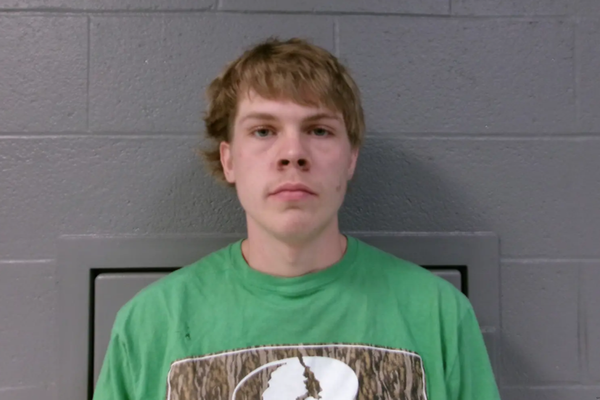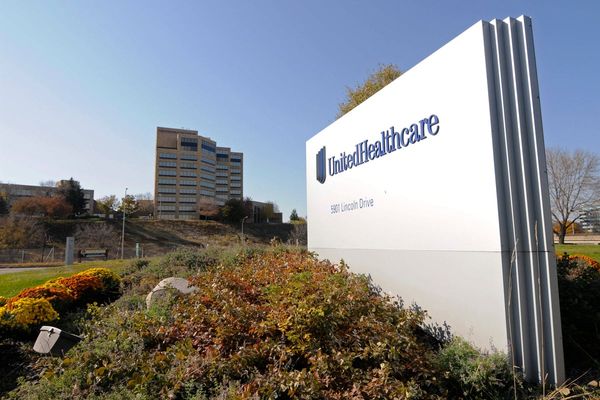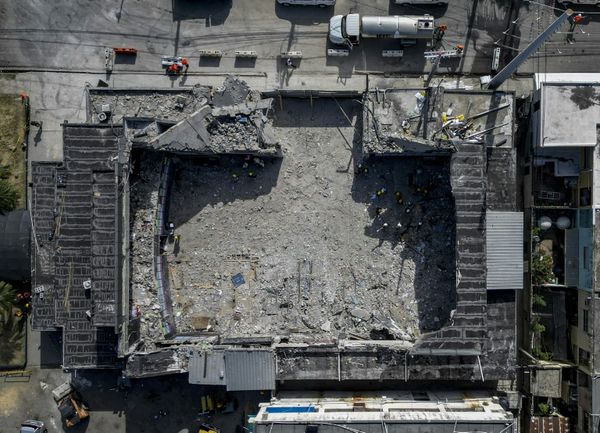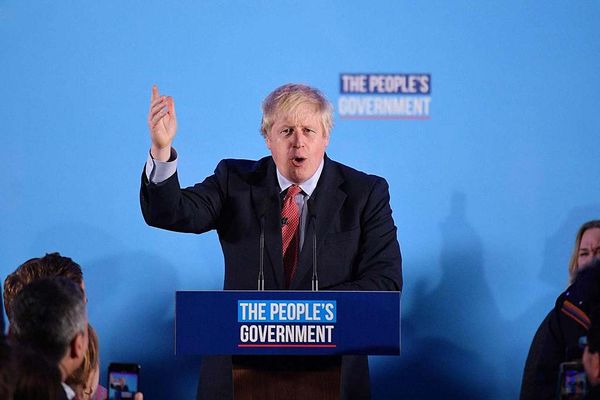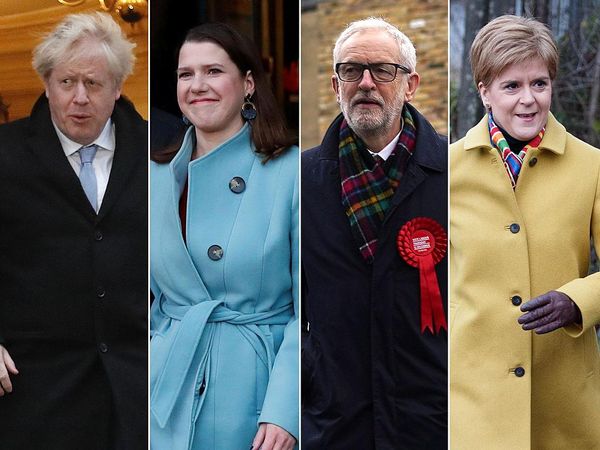The UK is set to leave the European Union within little more than a month, after a stunning landslide victory for Boris Johnson’s Conservatives in a general election fought on his promise to “get Brexit done”.
Long before the final votes were counted, it was evident that Mr Johnson was heading for historic gains on a scale which will give him a commanding majority in the Commons and allow him to push through his agenda unhindered.
The crushing defeat for Labour – forecast to record its worst tally of seats since 1935 – brought an end to Jeremy Corbyn’s career as leader, though he announced he would stay on during a “process of reflection”.
And Liberal Democrat leader Jo Swinson paid with her seat for a misjudged campaign based on a promise to revoke the Brexit referendum result and present her as a candidate for prime minister, losing to the SNP by a margin of just 149 votes.
With the bulk of seats declared, a BBC projection put Mr Johnson on track to secure 365 Conservative MPs to Labour’s 203, the SNP’s 48, Lib Dems’ 11, four for Plaid Cymru and one Green, giving him a projected majority in the House of Commons of about 80.
Despite the Tories’ domination of the Commons, it is believed that more voters cast their ballots for parties offering a second Brexit referendum than those promising to take the UK out of the EU without a Final Say vote.
A beaming Mr Johnson declared that the result – expected to deliver the largest majority for the Tories since Margaret Thatcher’s 1987 landslide – had given his government “a powerful new mandate”.
“This is a historic election that gives us now the chance to respect the democratic will of the British people, to change this country for the better and to unleash the potential of the entire people of this country,” said the prime minister. “That is what we will now do and that work will begin today.”
Mr Johnson pledged to earn the trust of Labour voters who, he admitted, "may only have lent us your vote" and would not necessarily back the Conservatives again in future. "If that is the case, I am humbled that you have put your trust in me... and I and we will never take your support for granted," he said.
In an indication that he may be planning to tack to the centre now he is no longer reliant on the votes of the hardline European Research Group or the DUP, he stressed that he will lead a “one nation” Conservative administration and repeated pledges to pump money into the NHS, increase nursing numbers by 50,000 and recruit 20,000 police.
Mr Johnson’s decision to appeal to working-class voters in the north of England and the midlands was emphatically vindicated as the Tories cut swathes through Labour’s heartlands, taking constituencies like Blyth Valley – the first of the party’s seats to fall – Burnley, Stoke-on-Trent Central, Redcar, Darlington, Leigh and Barrow and Furness.
Tony Blair’s old constituency of Sedgefield fell to the Conservatives, as did Tom Watson’s West Bromwich East and the Durham North West seat of rising star Laura Pidcock, seen by some as a possible successor to Mr Corbyn. And the totemic seat of Workington – home of white working-class Brexit-voting, rugby league-watching Workington man – went Tory after a century of almost unbroken Labour rule. Tories gained six seats in Wales from Mr Corbyn’s party.
Labour’s few consolation prizes came in the south, where Mr Corbyn’s party gained Putney in southwest London and held onto Canterbury by an increased majority in a further sign of how Brexit has shaken up the political geography of the UK. But it lost Kensington, where a failure to vote tactically saw the pro-referendum vote split with Lib Dems, allowing Conservatives through by a margin of just 150.
Speaking at the count for his Islington North seat minutes after being elected the constituency’s MP for a 10th time, Mr Corbyn said: “I will not lead the party into a future general election campaign.
“I will discuss with our party to ensure there is a process now of reflection on this result and on the policies that the party will take going forward, and I will lead the party during that period to ensure that discussion takes place and we move on into the future.”
Mr Corbyn insisted his manifesto promises of widescale nationalisations and tax hikes for the rich had been “extremely popular” and joined left-wing loyalists in blaming Brexit for the party’s wipeout.
But many of Labour’s remaining centrists were pointing the finger of blame at Mr Corbyn himself, with former minister Ben Bradshaw describing him as an “overwhelming negative” on the doorstep.
He is certain to face pressure to leave quickly to hand over to a new leader, with a battle brewing over whether a new leader should abandon his leftist programme.
Former MP John Mann, who saw his Bassetlaw seat in Nottinghamshire fall to Conservatives on a remarkable 18-point swing, said that Corbyn “ought to have resigned already”.
“Don’t underestimate the toxicity of Jeremy Corbyn and the cult around him,” said Lord Mann, who joins the upper house as the government’s antisemitism tsar. “People have made their minds up. They don’t want Corbyn and they don’t want Corbynism.
“If Labour doesn’t learn the lesson, the Labour Party might as well not exist.”
Former minister Caroline Flint, who lost her Don Valley seat, said: “Jeremy Corbyn has to recognise that it is not just about him. It’s about the politics what he espouses, the nature of the political debate that he has encouraged.
“I haven’t seen such sectarianism since I joined the Labour Party in 1979. It’s quite clear that the Corbyn project is not a project that is going to win us elections.”
Conservatives sensationally smashed their way into age-old Labour strongholds across the north of England, seizing the former mining area of Blyth Valley – Labour since 1950 – Darlington and Redcar, as well as the Cumbrian town of Workington, home of the totemic white working-class Brexit-backing voter who Mr Johnson sought to woo and Labour for virtually the whole of the last century.
Liberal Democrats made minimal gains from their dismal performance in 2017. High-profile defector Chuka Umunna failed in his attempt to win the Cities of London and Westminster for the Lib Dems and Luciana Berger fell short in Finchley and Golders Green, though the party unseated the Tories’ Zac Goldsmith in Richmond Park and took North East Fife from the SNP.
Ms Swinson made no immediate announcement on her future, but a promised statement later in the day was expected to herald her departure as leader.
She said: “For millions of people in our country, these results will bring dread and dismay and people are looking for hope.
“Liberal Democrats will continue to stand up for those values that guide our liberal movement – openness, fairness, hope. We will stand up for hope.”
The Scottish National Party were expected to take a near clean sweep of the 59 seats north of the border, fuelling Nicola Sturgeon’s demands for a second independence referendum in 2020.
The Scottish first minister declared she had a “renewed, refreshed, strengthened” mandate for an IndyRef2, and Mr Johnson – who lost seats north of the border – had “no right” to deny Scots the chance to determine their own future.

